Celebrating Helen During Women's History Month
[Editor's note: In light of Women's History Month, we'll be running a series of interviews with Helen Keller experts on the AFB Blog. The following Q&A comes courtesy of Doreen Rappaport, author of the award-winning biography Helen's Big World.]
Many books have been written about Helen Keller, including many children’s books. What motivated you to write one as well? What sets yours apart?
I visit many schools each year talking to children and educators. I learned that kids flock to reading books about Helen Keller. I realized that Helen’s struggles, her courage, her determination, and her grit, all inspire children about what is possible. I read some children’s biographies about her and thought I might tackle seeing if I could add something to the literature about her.
I think including her words in my book brings immediacy to her thoughts and ideas. I think the inclusion of Braille on the pages sets it apart. Many biographies about Helen Keller stop after the scene at the water pump. Helen Keller had a rich life, a big life. My book covers the many kinds of activities she was involved in as an adult—not just her working in trying to educate the public on what is necessary for people with disabilities.
I also believe the sensitive paintings by Matt Tavares, capture her struggles and triumph, and add greatly to the dramatic impact of her life.
Many of your books focus on acts of bravery and moral courage by both famous and ordinary people alike, which two or three women would you select as some of the most courageous? Aside from Helen Keller, do any of these women or person have disabilities?
Zitkala-Sa or Gertrude Bonnin (her Euro-American name) was taken from her Yankton mother off the reservation in South Dakota and sent to an Indian boarding school where white authorities tried strip her of her culture and language to "civilize" her. They failed. She became a prominent Indian reformer, founding the first civil rights group for Native Americans.
Thecla Mitchell is a triple amputee. She only has a left arm, but that’s hasn’t stopped her from driving or doing almost anything. Thecla is the only one in her family who went to college. She decided to run in the 1990 New York City marathon and three times a week she got up at four thirty in the morning and drove into Manhattan for a 90 minute workout at six o'clock to strength her muscles and improve her aerobic capacity. I went out on day training with her one day in Central Park and quite after five miles and she just went on. I was at the finish line when she crossed cheering with her family and friends. It was joyous.
As a young woman Helen complained that she was not taken seriously, that her disabilities as well as her gender were held against her. Helen never married nor did she have any children, rather, she dedicated her life to her work. Do you think that a woman still has to work harder than a man to be heard? How hard is it to be successful in one's career and still lead a full life?
Women still have to work harder than men to be heard. There is still too little representation of women as heads of corporations, non-profits, universities, etc. Women, who want to have families, also have the added problem of how to negotiate, how to juggle family life and career. Young men today are much more liberated than their fathers were but in almost all families, women who work outside the home still do more work in the home. A woman friend put it like this, "My husband does all the food shopping, but I'll know he's liberated when he makes the shopping list."
Has Helen inspired you in your work?
Helen Keller reminds me of what is possible. She triumphed over seemingly most impossible odds. She reminds me that I have been blessed with good health and opportunities and that I am responsible for creating my own life without any excuses.
I am also inspired by the dedication of Annie Sullivan. She is the role model of a great teacher.
Photo: Author Doreen Rappaport signs books for students.
